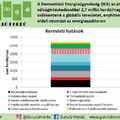There’s only a 1% chance your plane will crash. Enjoy your flight!
There’s no way around it: climate change is happening. Even if it’s unusually cold in June. And you don’t need to be a climate scientist to be convinced by the evidence. As some of our readers requested, we gathered the arguments in favor of climate change.
By Diána Szőke, Péter Simon Vargha and István Zsoldos
The scientific method can be used to decrease child mortality by 99.9%, to send robots to Mars, etc. On the other hand, denying scientific methods could lead to such extremes as the Inquisition. So that’s why we prefer the scientific approach to other alternatives – in the case of climate change as well. But this is a bit of a side note.
Hypotheses caught with a smoking gun
Let’s make one thing clear right at the beginning. Advocates of the scientific method (and we count ourselves among them), never accept or refute anything with 100% certainty. Only the layman believes in the idea of ultimate “scientific proof”, i.e. when hypotheses are caught with a smoking gun. This makes it difficult to argue with those who tend to think in absolute terms, because they are quick to point out that there is no comprehensive scientific consensus on a given topic.
So we can’t be completely sure that man ever walked on the moon, that the universe was not created just 4,000 years ago, or whether gravity works the same way if, for instance, I were to jump off a tall building without a parachute. But we do have very robust hypotheses on these issues. And until we come across convincing counter-arguments, it’s better to accept these theories.
The same holds true for climate change as well. We now have robust hypotheses on whether more CO2 leads to higher temperatures, whether CO2 concentration is rising, and whether all this is man-made. It’s practically impossible to examine every aspect of the climate change debate within one blog post, but we gathered some important arguments and links in the box below. And before you ask: no, we did not make separate CO2 measurements or our own climate model.
We were not there, but we still believe the moonwalk happened
In a modern society, we (and everyone else) first has to decide who and what we consider a reliable source of information, since we do not have first-hand experience of many things. We weren’t present at the moonwalk, or at the creation of the universe, nor have we ever tried a free-fall without a parachute (since, at least according to our accepted hypothesis, we wouldn’t have lived to write this post). In the modern world, we are therefore arguing just as much about the philosophy of science as we are about the science itself.
![Apollo_11[1].jpg](https://m.blog.hu/gu/gurulohordo/image/Apollo_11%5B1%5D.jpg) Another Hollywood special effect? Source: moonpans.com
Another Hollywood special effect? Source: moonpans.com
We know some people can never be convinced of climate change, or the fact that it’s a man-made development, even if temperatures were to rise by 5-6 C°; it’s too easy to retort that this could have happened anyways, who knows… Incidentally, climate change skeptics are much more likely to comment, and that is why we aren’t going to respond to them this time J
It’s interesting to consider why this issue causes such an emotional uproar, and why it fuels so many conspiracy theories. There are “religious fanatics” on both sides of the debate, even among those who accept climate change (they may see it as punishment for diverting too far from nature/God’s course, etc.). These are probably deep-rooted beliefs on how we see the world, and not just on the scientific problem itself (although the latter is significant enough on its own). There are a lot of knee-jerk emotional reactions: a sense of justice, “don’t think I’m stupid enough to believe that”, “we are just manipulated by external forces”, etc.
We’re more afraid of flying than driving
Another interesting question is how likely skeptics (and the average voter, who is probably somewhat skeptical as well) consider climate change to be a real problem. They are unlikely to see it as a pressing issue; we have learned from economic psychology that people are inclined to consider events with a small probability of happening to be impossible (fanatics, of course, can’t even interpret the question, since they think it’s all just a hoax). But there are also differences based on the “imaginability” and the presumed controllability of certain events. That is why we are more afraid of airplane crashes than car accidents (though statistical probability suggests otherwise), and why we feel even more uneasy after watching a plane disaster movie.

Source: memegenerator.net
Let’s put ourselves in the position of a non-fanatic climate skeptic. We should assign just a slight, maybe 1% or 5% probability to the notion that climate scientists’ consensus is in fact true, and that its consequences are real. In the case of a lot of other hypothetical events, even such a small probability would be shocking, especially if they are easy to visualize. Imagine, for example, the following headlines: “Giant asteroid has 5% probability of hitting Earth”, “New virus 1% likely to exterminate 90% of the human species”, or “There’s only a 1% chance your plane will crash. Enjoy your flight!”.
The illusion of controllability
Of course the danger only presents itself on the longer term, often in the form of contradictory phenomena, and we still have the illusion of controllability – if it turns out that we are in fact in trouble, we can still do “something”. But the problem is that both energy industry infrastructure and the global climate as a whole are systems that change only very slowly, with a great degree of inertia. They are like fast tanker ships, which take miles to slow down and deter from their original course. We can cut CO2 emissions, even down to zero, but we will still have a substantial amount of CO2 concentration increase on our hands. The current level is already twice that of the pre-industrial era, and there’s no quick-fix solution to disposing of it – and the effects of the current level haven’t even come across fully.
Taking a step back, cutting CO2 emissions to zero is only possible if we achieve some sort of breakthrough in commercial CO2-free technology, and if its use quickly becomes widespread. This means closing all existing coal- and gas-fired power stations, reconfiguring heating and transportation systems, etc., all of which would take a long time. So there are no guarantees that if we get around to doing “something”, we will finish it in time. But – on a more optimistic note – there are indeed chances of such a technological breakthrough, an example of which we will elaborate on in our next post.
Could the lab rats be experimenting with us? Climate change: arguments and consensus levels
Climate change is big enough of an issue that thousands of people, scientists and laymen alike, have weighed in on the arguments in favor and against the theory. Based on the evidence, we believe that the scientific consensus on climate change is, in fact, correct. The supposed refutations are not convincing, they often lack reasons as well as cause/effect mechanisms, and they are rooted purely in questioning opposing views. Wikipedia’s article on the topic, and the links embedded there, are a good starting point. (In addition, the scientific consensus on climate change is also reflected by the fact that it has been accepted by the science academies of all developed industrial countries.)
Below we briefly highlight some aspects of the debate, but you can read literally hundreds of pages on this topic, for example here and here.
- CO2 causes warming – greenhouse effect. Consensus level: very high. It’s a simple effect mechanism in physics: the atmosphere is transparent for most of sunlight, whereas it is only partially transparent for infrared radiation coming from the Earth’s surface. Higher CO2 concentrations reduce transparency. We suggest skeptics spend a longer period of time in a greenhouse during the summer, and then we’ll send them our counter-arguments on why we can’t be sure that it’s warmer inside than outside…
- Human activity is responsible for the rise in CO2 concentration. Consensus level: very high. This is underscored by the study of carbon isotopes as well as the decreasing level of oxygen concentration. Other factors, such as volcanic activity and plant absorption, have net negative effects, meaning that CO2 emissions increase at roughly half the rate than if they were to come from human activity-related emissions. You can find a good summary here.
- The climate is in fact warming. Consensus level: high. This of course raises a number of other questions, such as measurement accuracy, uncertainty over the temperature in previous time periods in Earth’s history, major fluctuations between average temperatures from one year to the next, the different behavior of various regions, etc. But even keeping all this in mind, there is a fairly large chance that underneath all the “noise”, the main trend points to rising temperatures. The time series we show here and also in our previous post (in Hungarian) shows that the average temperatures we experience in “cold years” is the same as the average in what used to be considered “hot years” just 100 years ago. And studies suggest that this cannot be fully explained by the fact the rural measuring stations have become more urbanized. Especially since warming is most profound in polar regions…
- Warming is mostly due to rising CO2 concentrations. Consensus level: high. The effects of CO2 on warming are easy to measure and predict. Doubling CO2 levels (without taking into consideration its consequences) increases temperatures by around 1 C°. But this warming also affects the amount of atmospheric vapor (which in turn produces a greenhouse effect). Due to a number of similar feedback loops, the likely overall effect (a.k.a. climate sensitivity) substantially exceeds 1 C°. The Intergovernmental Panel on Climate Change (IPCC) estimates it is closer to 2-4.5 C°, although its exact extent remains less certain. Keep in mind that these are long-term equilibrium effects – meaning that if we were to stop emitting CO2 from tomorrow onwards, temperatures would continue to rise (see The Economist’s recent summary here).
- Large-scale climate change would be harmful to humanity. Consensus level: medium. The majority of research concentrates on potential changes, not on how humanity can adapt to new conditions in a few decades’ time. At our current level of technological development, a fast and substantial rate of global warming (around 5 C°) would probably lead to the total collapse of agricultural production. Even a smaller temperature rise could render wine production impossible in traditional grape-cultivating regions, which is obviously almost as much of a threat to humanity :) But of course the implications are much less dramatic if, say, hamburgers were produced in laboratories. Biodiversity, however, would suffer as a consequence, and poorer countries would be less able to mitigate the effects of climate change than more prosperous ones.
Source: www.skepticalscience.com
So we’re all for skepticism in general, but until the emergence of more convincing counter-arguments to climate change, we suggest accepting this hypothesis, at least with a small degree of confidence… The exact parameters are of course open to debate, but it is fairly difficult to question the phenomenon itself.
One of our favorite books is “The Hitchhiker’s Guide to the Galaxy”. There is perhaps a teeny-tiny possibility that we find ourselves in the situation described by Douglas Adams in the book: that climate change is merely a social experiment conducted by some form of extra-terrestrial super intelligence disguising themselves as lab rats, to examine human reaction to such a danger…?
A bejegyzés trackback címe:
Kommentek:
A hozzászólások a vonatkozó jogszabályok értelmében felhasználói tartalomnak minősülnek, értük a szolgáltatás technikai üzemeltetője semmilyen felelősséget nem vállal, azokat nem ellenőrzi. Kifogás esetén forduljon a blog szerkesztőjéhez. Részletek a Felhasználási feltételekben és az adatvédelmi tájékoztatóban.





